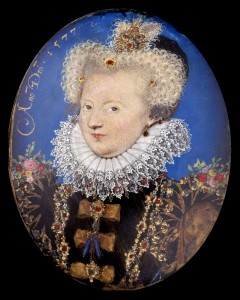Marguerite de Valois (1553-1615) was the youngest daughter of Henry II of France and Catherine de Medici. She was also the sister of three kings of France (Francis II, Charles IX and Henry III) and married a future King of France (Henry IV) who inherited when her brothers all died childless.
The devoutly Catholic Marguerite was forced by her brother Charles IX and mother into marrying the huguenot (a French Calvinist protestant) Henry of Navarre, who was also her cousin. He was the leader of the Huguenot party, and the marriage was a way for the Catholics to prevent Henry making a dangerous alliance through marriage, like the protestant Elizabeth I of England. Six days later the St Bartholomew’s Massacre occurred, widely believed to have been instigated by Catherine, Marguerite’s mother. It started at a series of high profile assassinations and descended into a mob violence against the Huguenots who were in Paris for the wedding of their leader. Marguerite is credited with saving the lives of several Huguenots that night, including that of her husband.
There was, however, no love between Marguerite and Henry. They had grown up at the royal court together, but there has never been a connection between them. Despite this Marguerite always helped Henry when she could, nursing him back from health several times and helping him to escape from the royal court, leaving herself to suffer the consequences. There was the obvious religious issue between them, but when they lived together in Navarre for a time, they managed this with relative harmony, each practicing their religion with their servants. The couple wanted children, not only as heirs for Navarre, but there was also the strong possibility that they could provide the heirs for France. However Marguerite (as time would tell) was infertile. This became apparent when Henry’s mistress became pregnant, and it was evident he could father children. Soon after this their marriage began to fracture and Marguerite returned Paris.
When Marguerite returned to Paris she was soon ostracised by her brother, King Henry III. He claimed she borne a bastard by Jaques de Harlay (which was false) and banished her from court. Marguerite then returned to Navarre to face a frosty reception, despite the fact she and Henry both openly took lovers. Marguerite then attempted a coup d’état on Agen (one of her appanages) which caused her brother Henry to imprison her, which her husband continued for a time when he became king. Marguerite used this time to write her memoirs, which are fascinating, and show her intelligence and the key diplomatic moments she was involved in. In 1580 her husband became King of France and sought an annulment with Marguerite (mostly due to their inability to conceive an heir together).
Marguerite spent the later years of her life helping the poor and supporting the arts, she also took an interest in the children of Henry and his second wife, Marie de Medici. Her memoirs were published posthumously and caused scandal in France.
If you are interested in learning more about this fascinating French royal, I would recommend reading her personal memoirs, which are available on Project Gutenberg.
-Danielle Triggs
Junior Girl
Girl Museum Inc.

